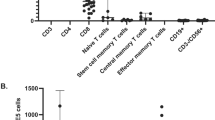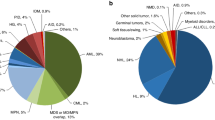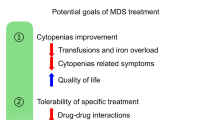Summary
To assess the effects of GM-CSF in patients with myelodysplasia, a total of 101 patients with refractory anemia (RA), RA with ringed sideroblasts (RARS), and RA with an excess of blasts provided that the percentage of blasts in the bone marrow did not exceed 10% (RAEB) were enrolled in the EORTC Leukemia Cooperative Group study 06885. They were randomized to receive two daily subcutaneous injections of rhGM-CSF (mammalian, glycosylated, Sandoz/Schering-Plough) at a daily dose of either 108μg glycoprotein (group I) or 216μg glycoprotein (group II) for 8 weeks. Response was defined as an increase in Hb (> 2.5 g%), neutrophil count (more than 100%), or platelet count (more than 100%) without progression of the disease. After exclusion of 19 patients who did not meet the entry criteria, 82 were evaluated. Fifty-four patients (66%) responded (27 of 42 patients in group I and 27 of 40 in group II). Progressive disease was seen in two patients of group I and in four of group II. Two of the latter developed leukemia. All responses were reflected in the granulocytic series. In two patients platelet numbers also increased. Cytogenetic analysis, successfully performed in 43 cases, showed that 14 of 16 patients with normal karyotypes responded, compared with 14 of 27 patients with abnormal karyotypes (p=0.008). In some cases GM-CSF was reduced in dose or discontinued prematurely due to side effects so that only 35% of all evaluable patients finished 8 weeks of treatment without a change of dose.
Similar content being viewed by others
References
Antin JH, Smith BR, Holmes W, Rosenthal DS (1988) Phase I/II study of recombinant human granulocyte-macrophage colony-stimulating factor in aplastic anemia and myelodysplastic syndrome. Blood 72: 705–713
Bennett JM, Catovsky D, Daniel DT, Flandrin G, Galton DAG, Gralnick HR, Sultan C (1982) The French-American-British (FAB) Cooperative Group. Proposals for the classification of the myelodysplastic syndromes. Br J Haematol 51: 181–199
Breslow N (1984) Comparison of survival curves. In: Buyse M, Staquet M, Sylvester R (eds) Cancer clinical trials: methods and practice. Oxford University Press, Oxford, pp 381–406
De Witte T, Muus P, De Pauw B, Haanen C (1990) Intensive antileukemic treatment of patients younger than 65 years with myelodysplastic syndromes and secondary acute myelogenous leukemia. Cancer 66: 831–837
Estey EH, Kurzrock P, Talpaz M, McCredie KB, O'Brien S, Kantarjian HM, Keating MJ, Deisseroth AB, Gutterman JU (1991) Effects of low doses of recombinant human granulocy-temacrophage colony-stimulating factor (GM-CSF) in patients with myelodysplastic syndromes. Br J Haematol 77: 291–295
Ganser A, Völkers B, Greher J, Ottmann OG, Walter F, Becher R, Bergmann L, Schulz G, Hoelzer D (1989) Recombinant human granulocyte-macrophage colony-stimulating factor in patients with myelodysplastic syndromes — a phase I/II trial. Blood 73: 31–37
Kerkhofs H, Hermans J, Haak HL, Leeksma CH (1987) Utility of the FAB classification for myelodysplastic syndromes: investigation of prognostic factors in 237 cases. Br Haematol 65: 73–81
Kobayashi Y, Okabe T, Ozawa K, Chiba S, Hino M, Miyazono K, Urabe A, Takaku F (1989) Treatment of myelodysplastic syndromes with recombinant human granulocyte colony-stimulating factor: a preliminary report. Am J Med 86: 178–182
Koeffler HP (1986) Preleukaemia. Clin Haematol 15: 829–849
Lagakos SW, Pocock SJ (1984) Randomization and stratification in cancer clinical trials: an international survey. In: Buyse M, Staquet M, Sylvester R (eds): Cancer clinical trials: methods and practice. Oxford University Press, Oxford, pp 276–286
Mufti GJ, Stevens JR, Oscier DG, Hamblin TJ, Machin D (1985) Myelodysplastic syndromes: a scoring system with prognostic significance. Br J Haematol 59: 425–433
Negrin RS, Haeuber DH, Nagler A, Olds LC, Donlon T, Souza LM, Greenberg PL (1989) Treatment of myelodysplastic syndromes with recombinant human granulocyte colony-stimulating factor. Ann Intern Med 110: 976–984
Negrin RS, Haeuber DH, Nagler A, Kobayashi Y, Sklar J, Donlon T, Vincent M, Greenberg PL (1990) Maintenance treatment of patients with myelodysplastic syndromes using recombinant human granulocyte colony-stimulating factor. Blood 76: 36–43
Peto J (1984) The calculation and interpretation of survival curves. In: Buyse M, Staquet M, Sylvester R (eds) Cancer clinical trials: methods and practice. Oxford University Press, Oxford, pp 361–380
Schuster MW, Larson RA, Thompson JA, Coiffier B, Bennett JM, Israel RJ (1990) Granulocyte-macrophage colony-stimulating factor (GM-CSF) for myelodysplastic syndrome (MDS): results of a multi-center randomized controlled trial. Blood 76: 10: 318
Siegel S (1956) Non-parametric statistics for behavioral sciences. McGraw-Hill, New York
Suciu S, Kuse R, Weh HJ, Hossfeld DK (1990) Results of chromosome studies and their relation to morphology, course, and prognosis in 120 patients with de novo myelodysplastic syndrome. Cancer Genet Cytogenet 44: 15–26
Thompson JA, Lee DJ, Kidd P, Rubin E, Kaufmann J, Bonnem EM, Fefer A (1989) Subcutaneous granulocyte-macrophage colony-stimulating factor in patients with myelodysplastic syndrome: toxicity, pharmacokinetics and hematological effects. J Clin Oncol 7: 629–637
Tricot G, Vlietinck R, Boogaerts MA, Hendrickx B, De Wolf-Peeters C, Van den Berghe, Verwilghen RL (1985) Prognostic factors in the myelodysplastic syndromes: importance of initial data on peripheral blood counts, bone marrow cytology, trephine biopsy and chromosomal analysis. Br J Haematol 60: 19–32
Vadhan-Raj S, Keating M, LeMaistre A, Hittelman WN, McCredie K, Trujillo JM, Broxmeyer HE, Henney C, Gutterman JU (1987) Effects of recombinant human granulocyte-macrophage colony-stimulating factor in patients with myelodysplastic syndromes. N Engl J Med 317: 1545–1551
Yuo A, Kitagawa S, Okabe T, Urabe A, Komatsu Y, Itoh S, Takaku F (1987) Recombinant human granulocyte colonystimulating factor repairs the abnormalities of neutrophils in patients with myelodysplastic syndromes and chronic myelogenous leukemia. Blood 70: 404–411
Author information
Authors and Affiliations
Consortia
Rights and permissions
About this article
Cite this article
Willemze, R., van der Lely, N., Zwierzina, H. et al. A randomized phase-I/II multicenter study of recombinant human granulocyte-macrophage colony-stimulating factor (GM-CSF) therapy for patients with myelodysplastic syndromes and a relatively low risk of acute leukemia. Ann Hematol 64, 173–180 (1992). https://doi.org/10.1007/BF01696219
Received:
Accepted:
Issue Date:
DOI: https://doi.org/10.1007/BF01696219




